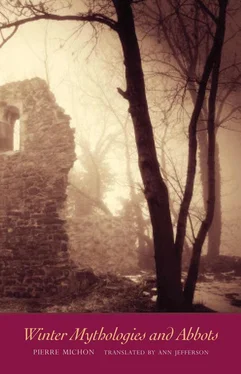It’s the fifth day before All Souls’. The rain is also waiting for the great Builder, the Vienne has burst its banks, the crowds which gathered well before dawn are wading through an unbridled River Jordan. Finally the prelates arrive with the kings, the crowd pulls back, they enter the basilica, and its doors close. Theodelin and his scribe are among their number, with the great abbots in black. The pedunculated silver ball appears between the hands of the archbishop of Bordeaux; he lifts off the lid, and the scribe sees the cranial skullcap of the illiterate saint who had a way with words. The archbishop gently removes the skull: it’s there, in its entirety, with its dead man’s teeth. It’s placed on the altar, smoke rises from the incense, the chants start up, the bells ring out, and outside the multitudes rage. The doors open, the head brandished aloft appears on the portico. The crowds, wide-eyed, clamor, those at the back are unable to see properly because of the rain, the weighty monster which presides over the depths of the masses starts to move, those at the front climb the steps so as not to be crushed, the skull and the archbishop beat a retreat, and all the ordinary folk from the Limousin and Aquitaine, from Poitou, charge with their monster’s weight from the Vienne to the church. The clerks and the kings create a rampart for the relic with their bodies, men trampled underfoot scream — and chance has driven Theodelin and Pierre right up against the altar, right up against John the Baptist. Pierre then sees the following: Theodelin deftly opens the dead man’s jaw, takes hold of a tooth at the back which is slightly loose, wrenches it out, and hides it inside his own mouth. The clerks and the kings have finally cleared the door at the back and flee with the relic. Theodelin carries off the mouth with golden words inside his own mouth.
Pierre says that he never knew whether the abbot saw that Pierre had seen him.

At Maillezais they are short of relics: all they have is a yokel right at the bottom of the sainted hierarchy, Rogomer, whose remains were made over to them by the count of Tours and reluctantly conceded by Cluny to be holy. Throughout the return journey, Theodelin, brooding, thinks about the destiny he needs to ascribe to this powerful bone which lies against his tongue and on which another tongue once rested in order to vociferate in the wilderness. Although his abbey is the most powerful in the gulf, the best built, the whitest, it is not powerful enough to flaunt the theft in the face of Angély, which is equally powerful. To say that the Forerunner lost a tooth at Maillezais would stretch all credulity. He will have to wait.
The tooth disappears.
Adémar didn’t even notice its disappearance in Charroux, Pierre hasn’t seen it since Theodelin filched it, and he won’t see it again until much later: the chronicles are no use to me here; I shall go in search of it myself.
Theodelin has also always been in the habit of disappearing for a while: he hands the keys over to the prior, climbs into a boat, and pushes off downstream. The monks are used to it and do not comment. They know more or less where he goes: it’s that time in history; he goes on retreats in the wilderness — in this case on the easternmost island in the bay (more of an islet), which raises a steep and jagged prow toward the sea but whose stern settles onto a long sandy slope where you can land, the Île de Grues. There’s not a living soul on it, scarcely any trees; the wind blows across it and sweeps down the valley of the River Lay. In winter, as now, the marshes disappear beneath the forthright sea — except for the reclaimed land that lies, just across to the south and almost within earshot, on the other eastward island, the other abbey on the gulf, Saint-Michel-en-l’Herm. On the higher part of the island, in the middle of a chaotic scattering of rocks, Theodelin has built himself a roof of wooden planks and a bed of sand, from where he can hear the sea and the wind without suffering their effects. The sea is like the sands of Egypt. It’s true that Theodelin no longer really believes in the wilderness and the mortifications of Jerome and Martin, and this makes him uneasy; on the other hand, he knows that language is re-created in this windswept solitude, it recovers its focus and its fulcrum, so that on his return it cuts clean through the chatter of the monks and decisively slaps down all the blustering little monads with the Universal Monad. This is where he has come in this month of November with the tooth of John the Baptist in his mouth or in a little leather pouch, depending on his mood.
John the Baptist is returning to the wilderness.
The fishermen bring his pittance, or a monk from Saint-Michel, whose cellars are well stocked. Most often the purveyor is Hugues, a young and sturdy brother. His large body is awkward — not that he knocks over the things he has in his hand, but as if the things he is holding and the gesture itself were suspended in the void. It’s the same with the way he speaks. He’s the opposite of a chatterer: he never remarks on the salted herring or the bread that he unloads, never offers any explanation if today it’s fresh sardines or gruel instead; he never comments either on what’s happening at Saint-Michel, the mandates, the betrayals, the boredom or the joy as one day follows the next. If he’s asked a question, he stammers a little and blushes. But if, while the younger man is carrying his herring up to the hut, Theodelin takes it upon himself to remark in misty weather that the sea and the sky are as hard to disentangle as the Chaos and the Void, or to point out the shape of an ox in the clouds which gradually turns into a man and is sliced in two, then Hugues abruptly sets down his keg of herring and begins to speak, without the hint of a stutter. He says, No, what he sees is more like the shape of a stag, and of a woman sliced in two, and though you might think the sea and the clouds are not disentangled, they nevertheless are, since they’re the flesh and the spirit. He can talk like this for hours on end — you just have to prompt him from time to time — then he stops all of a sudden, embarrassed and as if to apologize. He names only those things that can be interpreted and gradually extended to cover the entire world, things that you can match and substitute with words. He’s not a chatterer, but a born preacher, and he doesn’t know it. Although Hugues is very thin, tall, and covered in a thick pelt of hair, whereas the other man is stocky and already bald, Theodelin likes to link him in his mind with Pierre, his scribe. He’s like the opposite twin: he speaks the way the other man writes, in a strange mixed state of awkwardness and elation. And it satisfies neither of them, the scribe or the word-spinner.
He has already come several times this winter. As secrets are hard to keep, and as Theodelin is itching to confess, at each visit he has suggested something to Hugues which one way or another might set him on the trail of John the Baptist — and it’s not at all difficult: the paths where one man always precedes another, the goatskin which you wear in winter over your black habit, the interminable baptism of the rain, a dove flying past in a brief spell of sunshine, the decapitated clouds, everything comes back to John the Baptist, the Forerunner, the Supplanted, the man who spoke loud and strong and who, because of his words, was sliced in two in Machaerus on the shores of the Dead Sea. One day in January the sea is wailing like a small child beneath a leaden sky, which may be threatening snow; everything in the bay stands out very clearly, sharply delineated, each emerging for what it is, separate, and this distresses Theodelin, who is separate and alone like a small child. He can feel his old injuries, the broken thigh from long ago, the betrayal of his former race, remorse. The boat arrives; it’s Hugues bringing a ham in a sack for the last days before Lent. Without a word they walk up the path with the sack; Theodelin limps along in front; they enter the hole with its rock walls and its roof of wooden planks, where the fire is lit. Hugues takes out the ham and hangs it up by the fire, Theodelin goes over to the little altar which bears a crucifix, picks up a small leather pouch, and in front of Hugues takes out a tooth — it might have fallen out of his own mouth the minute before — he says it’s a tooth belonging to John the Baptist.
Читать дальше












